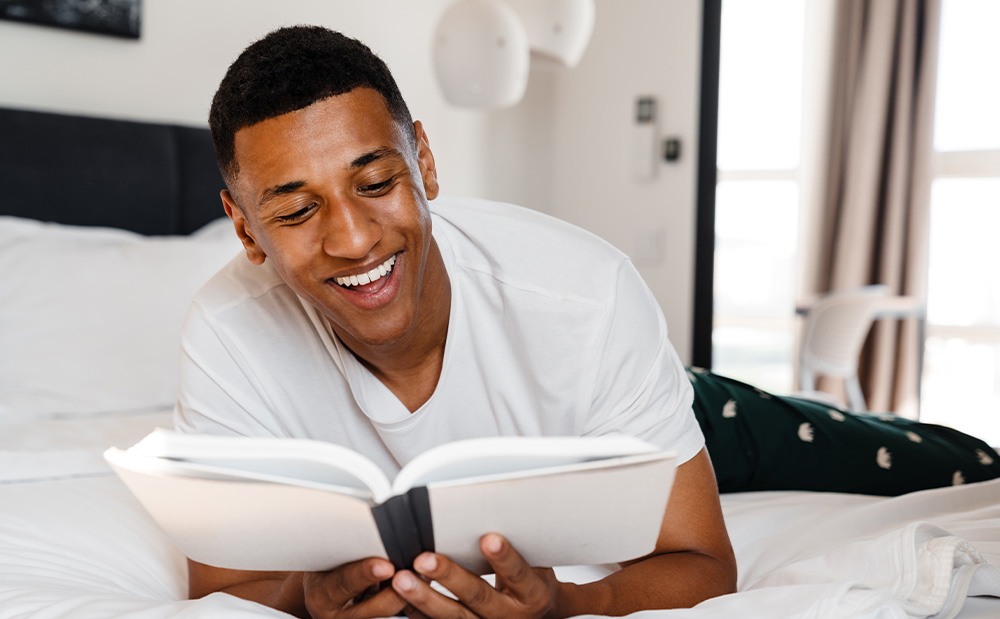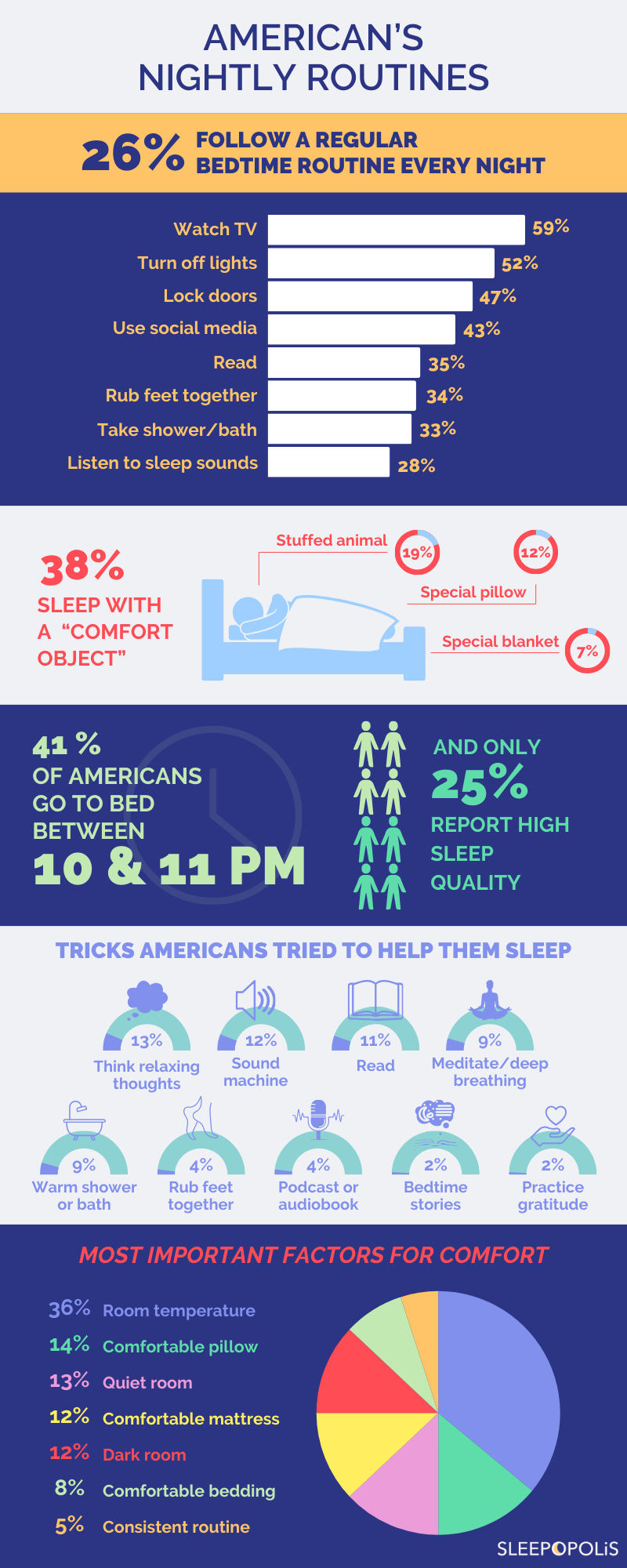
If you don’t have one already, a bedtime routine can be an invaluable addition to your evenings. This established set of habits, practiced consistently, is a signal to your body and mind that it’s time to settle down for sleep — and they’re not just for kids. Bedtime routines for adults can be the key to better sleep. To learn more about whether most adults are practicing nightly sleep routines, Sleepopolis conducted a survey with 500 participants and spoke with Lauri Leadley, a clinical sleep educator and the founder and president of Valley Sleep Center, about the results.
Long Story Short
- A bedtime routine for adults can make it easier to fall asleep faster and enjoy better sleep.
- Our survey found that 76 percent of adults who follow a bedtime routine report high sleep quality.
- More than two-thirds of survey respondents also report sleeping with a comfort object, such as a special pillow, blanket or stuffed animal.
- Other bedtime activities reported in our survey include watching television, checking that lights and appliances are off and making sure the door is locked.

The Benefits of a Nightly Routine
“A bedtime routine is important because it puts us in the frame of mind that we’re winding down and preparing our body, mind, and heart for rest,” Leadley tells Sleepopolis. That was partially reflected in our survey: While 76 percent of respondents who follow a bedtime routine at night said their sleep quality was very high, only 20 percent of respondents overall said their bedtime routine helps them sleep significantly better.
Consistency is key, and that’s where many of our survey respondents may have fallen a little short. Just 26 percent of those surveyed follow a regular bedtime routine every night. A little more than half reported that they do so most nights, 16 percent only on some nights and 4 percent of respondents said they never follow a bedtime routine.
Why So Many of Us Hang On To Comfort Objects
Thirty-eight percent of respondents to our survey said they sleep with a comfort object. Of those, 19 percent sleep with a special pillow, 12 percent sleep with a special blanket and 7 percent sleep with a stuffed animal. Leadley says that all of these items fall into “security blanket” territory. “A favorite pillow, stuffed animal, sleep partner or even a live pet can provide warmth and comfort at night,” she adds.
Our Favorite Bedtime Hacks: Which Ones Really Work?
According to our survey, 59 percent of people watch a TV show or movie before bed. The second and third most common reported activities, at 52 percent and 47 percent respectively, are checking that lights and appliances are turned off and making sure the door is locked.
Other bedtime routine activities reported in our survey include:
- Using social media: 43 percent
- Reading: 35 percent
- Completing a skincare routine: 34 percent
- Taking a shower or bath: 33 percent
- Listening to sleep sounds: 28 percent
Though this might all sound relaxing on paper, some of these habits may actually be counterintuitive to getting a good night’s sleep. By watching TV or scrolling social media, the majority of our respondents are exposing themselves to blue light at bedtime. Research shows that using interactive devices in particular, such as phones, laptops and video games, within an hour before bedtime is associated with poor sleep quality and difficulty falling asleep (1). That’s one reason that limiting screens before bed is considered an important part of sleep hygiene, the set of actions and lifestyle habits that are designed to promote healthy sleep.
On the other hand, those respondents who include reading, personal care activities and listening to sleep sounds before bed are practicing bedtime activities that can make it easier to drift off. In fact, they’re among the calming activities Leadley recommends for helping the body wind down in preparation for sleep, along with taking a warm bath, moving through relaxing yoga stretches, enjoying a cup of chamomile tea and using aromatherapy. Respondents also shared a number of personal hacks for falling asleep:
- 13 percent say they think about a relaxing scenario
- 12 percent use a sound machine
- 11 percent practice meditation or deep breathing
- 9 percent read a relaxing or boring book
- 9 percent take a warm shower or bath
- 4 percent rub – or “cricket” – their feet together
- 4 percent listen to a podcast or audiobook
- 2 percent listen to bedtime stories
- 2 percent practice gratitude
Seventeen Percent Report Low Sleep Quality — Why?
In our survey, the majority of respondents reported fair to poor sleep quality, with 51 percent rating their sleep quality as average, 17 percent rating it as low and 1 percent rating it as very low. Just 25 percent of respondents said their sleep quality was high, and only 5 percent would classify it as very high. Twenty-three percent of those surveyed said it typically takes them more than 30 minutes to fall asleep.
According to Leadley, there could be a number of issues that result in poor sleep. In addition to stress and anxiety, which can make it difficult to fall asleep, your sleep environment and routine can play a big role over the course of the night. Research shows a direct link between sleep deprivation and mental health conditions, such as chronic stress, anxiety, and depression (2).
Leadley says things like waking up to use the bathroom or simply sharing the bed with someone who snores or has sleep apnea are disruptions that may interfere with restful sleep. When restless nights become the norm and overall sleep amount declines, that’s when problems begin. “Just a few hours of sleep loss increases stress levels, impairs daily functioning, and lowers work productivity,” says Leadley. Studies show that poor sleep also leads to other health issues you might not expect, such as worse symptoms relating to erectile dysfunction or urinary tract conditions (3).
Luckily, bedtime doesn’t play too much of a factor in sleep quality — Leadley says that consistency in sleep and wake times and the amount of sleep you’re getting every night is more important than the actual time you go to bed as long as you’re listening to your body’s cues. For our survey respondents, the most popular bedtime is between 10 and 11 p.m.; however, 34 percent of respondents have more night owl tendencies, with reported bedtimes after midnight.
Research does show that our biological clock — also known as our circadian rhythm — is synchronized by day and night patterns. So, if you go to bed earlier or later than you typically do or stay up all night and try to sleep during the day, you may find it difficult to fall and stay asleep (4).
What Keeps Us Comfortable at Night
Temperature goes further than having the perfect pillow or comforter, according to our survey respondents. More than two-thirds say that room temperature is the most important factor when it comes to being comfortable enough to sleep. Experts agree, generally recommending keeping the bedroom between 68 and 77 degrees Fahrenheit for optimal sleep (5). However, it also depends on factors such as personal preference, age, and health status.
Survey respondents also reported that specific details like bedding, noise and light played a big role in their ability to get and stay comfortable during the night:
- 14 percent like a comfortable pillow
- 13 percent prefer a quiet room
- 12 percent prefer a dark room
- 12 percent prefer a comfortable mattress
- 8 percent prefer comfortable sheets or blankets
Comfortable bedding and a comfortable, supportive pillow and mattress are important for a good night’s sleep, and so is managing sound and light (6) (7). All three are components of good sleep hygiene, along with consistent bed and wake times, and it’s not surprising that our survey respondents emphasized these details as priorities for a good night’s sleep.
The Last Word From Sleepopolis
While Leadly says there are benefits to a relaxing bedtime routine, especially for adults, only about one quarter of survey respondents practice this nightly habit. What’s more, over three quarters of respondents report watching TV before bed, which could set them up for a restless night. If your sleep could stand to improve, following a bedtime routine as part of good sleep hygiene could be helpful.
FAQs
Why should adults have a bedtime routine?
“A sleep routine is essentially a pattern or habit we implement that helps us to signal the brain that we’re calling it a day,” says Leadley. By following a consistent bedtime routine, we can help establish positive habits for more restful nights.
Is there an ideal bedtime for adults?
Since everyone has different circumstances and responsibilities, there’s really no single ideal bedtime. “Consistency in sleep and wake times is more important than actual ‘bedtime’ and the number of hours per night is key, too,” says Leadley.
Sources
- Silvani MI, Werder R, Perret C. The influence of blue light on sleep, performance and wellbeing in young adults: A systematic review. Front Physiol. 2022;13:943108. Published 2022 Aug 16. doi:10.3389/fphys.2022.943108
- National Heart, Lung, and Blood Institute. Sleep Deprivation and Deficiency – How Sleep Affects Your Health | NHLBI, NIH. www.nhlbi.nih.gov. Published June 15, 2022. https://www.nhlbi.nih.gov/health/sleep-deprivation/health-effects
- Kohn TP, Kohn JR, Haney NM, Pastuszak AW, Lipshultz LI. The effect of sleep on men’s health. Transl Androl Urol. 2020;9(Suppl 2):S178-S185. doi:10.21037/tau.2019.11.07
- Cleveland Clinic. Circadian Rhythm Disorders: Sleep Disorders | Cleveland Clinic. 2020. https://my.clevelandclinic.org/health/diseases/12115-circadian-rhythm-disorders
- Baniassadi A, Manor B, Yu W, Travison T, Lipsitz L. Nighttime ambient temperature and sleep in community-dwelling older adults. Science of The Total Environment. 2023;899:165623. doi:https://doi.org/10.1016/j.scitotenv.2023.165623
- Yamagami Y, Obayashi K, Tai Y, Saeki K. Association between indoor noise level at night and objective/subjective sleep quality in the older population: a cross-sectional study of the HEIJO-KYO cohort. Sleep. 2023 May. https://doi.org/10.1093/sleep/zsac197
- Blume C, Garbazza C, Spitschan M. Effects of light on human circadian rhythms, sleep and mood. Somnologie (Berl). 2019 Sep;23(3):147-156. doi: 10.1007/s11818-019-00215-x. Epub 2019 Aug 20. PMID: 31534436; PMCID: PMC6751071.



























